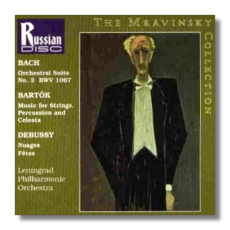
The Internet's Premier Classical Music Source
Related Links
- J.S. Bach Reviews
- Latest Reviews
- More Reviews
-
By Composer
-
Collections
DVD & Blu-ray
Books
Concert Reviews
Articles/Interviews
Software
Audio
Search Amazon
Recommended Links
Site News
 CD Review
CD Review
The Mravinsky Collection

- Johann Sebastian Bach: Orchestral Suite #2
- Béla Bartók: Music for Strings, Percussion, and Celesta
- Claude Debussy: Nocturnes: Nuages & Fêtes
Leningrad Philharmonic Orchestra/Evgeny Mravinsky
Russian Disc 11167 (Koch) 63min
The Bach is model of how large ensemble performances of this music ought to go, should some enterprising conductor care to revive this now forgotten practice in our authenticity-crazed times. As Mravinsky neatly demonstrates, Bach with a full modern symphony orchestra need not be heavy and turgid (like Klemperer's) or unnecessarily wayward (Stokowski). Textures are transparent, and the conducting is alert, straighforward, and unaffected. In general, Mravinsky's lively tempos are not significantly different from Helmuth Rilling's "historically-informed" Hänssler recording, though the Russian does slow down at the end of each movement in the old-fashioned manner. Only Mravinsky's sarabande is noticeably broader than Rilling's (3:14 vs. 2:18). Mravinsky's sole concession to authenticity is the presence of a harpsichord, which is only intermittently audible and certainly not missed when it disappears into the background. The Leningrad ensemble produces a rich and lovely sound in this music, and their playing is especially notable for its precision and joyous abandon. The monophonic recording is exceptionally good for its day (1961) – far cleaner and clearer than this label's unfortunately low average. Occasional audience noise indicates a live performance, but this crowd is neither intrusive nor irritating. Unfortunately, the well-deserved applause at end is abruptly cut off rather than faded out, but that is a minor irritation. Mravinsky's large-scale Bach should be a revelation to those who've grown up with nothing other than scrawny period bands and miserable "authentic" instruments in this repertory. Strongly recommended for the adventurous – and for other heretics like me who actually want to hear symphony orchestras play the cornerstones of the baroque repertory.
The two oddly chosen fillers are not nearly as memorable. Next to Bernstein's probing and deeply expressive account of the Bartók on Sony, Mravinsky sounds aimless and uncomfortable with the strangeness of the composer's idiom. The miserable 1970 mono recording lends an annoying harshness to the strings, while the lack of stereo separation vitiates the impact of Bartók's antiphonal writing. The restless audience is particularly irritating in the quiet introduction, and both conductor and ensemble seem confused about how the piece should end. Mravinsky's atmospheric Debussy is seriously undermined by the continual hacking of the audience and Russian Disc's distorted, distant, and badly muffled 1960 mono recording.
Copyright © 1996, Thomas Godell


















